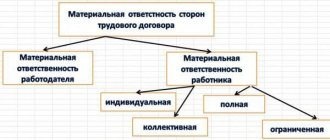Job description of an economist
The job description of an economist is a comprehensive document of an organizational and legal nature, containing a description of the main functions, rights, duties and responsibilities of this specialist.
You will learn about another document of primary importance when hiring an economist from the article “Unified Form No. TD-1 - Employment Contract.”
The main purpose of the job description of an economist (JIE) is to outline the range of mandatory actions of the employee holding this position and to delimit the scope of his activities in the overall set of responsibilities of the company’s specialists.
In addition, DIE allows you to implement the following important organizational tasks:
- specify the duties and rights of a specialist;
- distribute work responsibilities evenly among employees of the economic planning service;
- Ensure that the employee completes assigned tasks on time and in full;
- structure the employee’s functional relationships with other specialists;
- increase employee responsibility;
- identify a clear dependence of the economist’s incentives (both moral and material) on the completeness and quality of the duties performed;
- ensure objectivity when certifying a specialist;
- improve the psychological climate in the work team and eliminate conflicts.
The profession of an economist combines both unified characteristics common to all sectors of the economy and individual characteristics characteristic only of a certain area. So the DIE will look different at different enterprises and in different fields of activity. We will talk about this in the following sections.
Job description and professional standards
When developing job descriptions, it is necessary to take into account professional standards approved for different areas of activity.
Professional standards are strictly structured documents describing the requirements for the level of qualifications and functional responsibilities of specialists in various fields in various fields of activity, approved by orders of the Ministry of Labor and Social Protection of the Russian Federation.
For example, the professional standard for specialists in planning and economic support for the activities of water supply and sanitation organizations was approved by Order No. 166n dated March 19, 2015, and the professional standard for specialists in the field of planning and economic support of construction production was approved by Order No. 504n dated July 18, 2019.
IMPORTANT! Since July 2016, employers have been required to use professional standards in terms of their requirements for the qualifications necessary for an employee to perform job duties (Federal Law “On Amendments to the Labor Code of the Russian Federation...” dated May 2, 2015 No. 122-FZ).
Thus, if Art. 57 of the Labor Code of the Russian Federation and the Decree of the Government of the Russian Federation “On the Rules for the development, approval and application of professional standards” dated January 22, 2013 No. 23 established a restriction (for example, according to the level of education for a certain position), the merchant will be required to apply the professional standard. He will have to take this limitation into account when developing job descriptions.
Who is a labor and wage economist?
Recently, vacancies for labor and wage economists have increasingly appeared on the labor market - this is due to the gradual increase in the share of industrial production in the economy.
The specialty was not very popular for a long time. The position is not available in small and micro enterprises. Only in large companies with a large number of employees does the job of a labor and wage economist appear—separate staff positions are created to perform it. A specific list of responsibilities, requirements for education and qualifications of a specialist are contained in the DI. Depending on the structure of the enterprise, the employee performs the following tasks in various combinations. To prepare the DI and specify the list of responsibilities of the wage economist, the following are used:
- ECSD.
- Register of professional standards.
Important. Which document to use is decided by the employer, with the exception of cases specifically specified in the Federal Law of the Russian Federation and industry regulations (Letter of the Ministry of Labor of Russia dated April 4, 2016 No. 14-0/10/B-2253). In accordance with the document, since 2016, the employer, if there is a direct legislative or regulatory instruction, is obliged to use professional standards for positions for which restrictions are established, compensation or benefits are provided.
Important. The punishment for non-application of professional standards is the same as for violations of the Labor Code of the Russian Federation - Art. 5.27 Code of Administrative Offenses of the Russian Federation.
For most types of activities, the use of professional standards (and ECSD for the transition period) is advisory in nature. Using a detailed professional standard:
- job responsibilities are well defined;
- employment contracts and DI are drawn up;
- certification and recertification are carried out;
- salaries are set for various positions;
- staff training is planned and carried out.
ConsultantPlus experts discussed how to draw up a job description correctly. Use these instructions for free.
DIE structure
The general structure of the DIE sections can be represented as follows:
- qualification requirements;
- subordination structure;
- what an economist should know (regulatory regulations, instructions, industry tariffs, etc.);
- responsibilities;
- rights;
- responsibility.
The first section of the DIE can be quite short and contain only 1–2 lines expressing the requirements that the company’s management places on a specialist in this position.
For example, this section might look like this: “Economist: higher professional education in economics with at least 2 years of work experience in a similar position.”
Or the employer allows a specialist to have a secondary specialized education in an economics specialty, but with increased requirements for length of service and the level of previously held positions.
Important! The economist's qualification level, specified in his job description, must meet the requirements established by the relevant professional standards.
For example, the level of qualifications for specialists in economic planning is determined by professional standards from 4th and above. At the same time, at the 4th and 5th qualification levels, secondary specialized education plus practical experience is allowed, and starting from the 6th level, in addition to practical experience, a specialist must have a higher education in a bachelor’s program.
The section of the DIE devoted to the subordination structure can also look quite succinctly: “The economist promptly reports to the financial director of the company.”
If the company has a large staff and an extensive management system in the DIE, it is better to describe in detail the scheme of general and direct subordination of the employee.
The next section of the DIE contains a list of standards: instructions, regulations and other documents necessary for the work of an economist. The breadth of this section depends on management’s intentions to require from its specialist general economic planning knowledge and mastery of highly specialized theoretical issues and practical skills.
We will talk about the duties, rights and responsibilities of an economist in the next section.
Education and experience
A specialist can claim or in the past be a leading economist of a planning department or a chief economist of a planning and economic department. In this regard, the Ministry of Labor imposes the following qualification requirements:
| Planning economist, category I | Higher professional (economic) education and work experience as a planning economist of category II for at least 3 years |
| Economist for planning II category | Higher professional (economic) education and work experience as a planning economist or other engineering and technical positions filled by specialists with higher professional education, at least 3 years |
| Planning Economist | Higher professional (economic) education without work experience requirements Or secondary vocational education and work experience as a planning technician of category I for at least 3 years or other positions filled by specialists with secondary vocational education for at least 5 years |
Rights, duties and responsibilities of an economist
The section of the DIE devoted to the rights of an employee makes it possible to give the job description the status of a full-fledged document in the relationship between the employee and the employer. An employee’s knowledge of his rights facilitates the process of interaction between a specialist and management and allows the employee to achieve an understanding of his role in the overall production process.
For DIE, a simple listing of rights is sufficient.
For example:
“An economist has the right:
- request from structural units and divisions operational data and working documentation necessary to carry out their labor functions;
- make operational decisions within the limits of their powers;
- develop and present to management proposals aimed at optimizing work processes, including those related to their direct activities;
- make proposals to eliminate identified deficiencies in work;
- get acquainted with the draft decisions of the company’s administration if they directly relate to its activities.”
The responsibilities of an economist can be presented in the DIE in the form of a list or text. The form in which the information is presented is not particularly important; the main thing is the completeness of the reflection of the entire scope of mandatory labor actions required of the employee.
You can see and download what the DIE section on responsibilities looks like, as well as the full text of this document, by clicking on the picture below:
The section devoted to the employee’s responsibility should list the types of his responsibility for the results and consequences of his activities (disciplinary, material, etc.). At the same time, it would not be amiss to note what punishment awaits a specialist for slowness in solving production issues (failure to take timely measures or actions related to his duties).
IMPORTANT! When providing for liability measures in the DIE, it is necessary to be guided by the norms of the current legislation and not exceed the powers granted to the employer.
The job description of an economist, a sample of which is posted on our website, will help you fill out this section of the DIE.
Main responsibilities of a planning department economist
The basic set of job responsibilities of an economist in the economic planning department boils down to the following:
- work on economic planning at the enterprise, aimed at organizing rational economic activities, determining the proportions of production development based on specific conditions and market needs, identifying and using production reserves in order to achieve the greatest performance;
- generates initial data for drawing up draft long-term and annual plans for production and economic activity and development of the enterprise, develops, taking into account forecast and marketing data, individual sections of the plan broken down by quarter, carries out calculations and justifications for them, communicates planned indicators to the production divisions of the enterprise;
- promptly introduces changes to the relevant sections of the plan due to market conditions and competition, ensures a balanced production of products based on supply and demand;
- takes part in feasibility studies for the development of new types of products, new equipment and advanced technology, mechanization and automation of production processes;
- develops technical and economic standards for material and labor costs to determine the cost of production, planned prices for the main types of raw materials, materials, fuel, energy consumed in production;
- prepares cost estimates for commercial products, develops draft wholesale and retail prices for manufactured products, tariffs for work (services) taking into account market conditions;
- takes part in the development of measures for the effective use of capital investments, increasing the competitiveness of manufactured products and labor productivity, reducing production costs and sales of products, increasing production profitability, increasing profits, eliminating losses and unproductive expenses, as well as in introducing and improving intra-economic accounting at the enterprise and its divisions, improvement of planning and accounting documentation, in the preparation of methodological materials on the organization of on-farm planning;
- a comprehensive economic analysis of the economic activities of the enterprise and its divisions, identifies production reserves and outlines measures to ensure savings, more efficient use of enterprise resources, identifying opportunities for additional production and sales of products, increasing the growth rate of labor productivity;
- controls the correctness of calculations of the economic efficiency of introducing new equipment and technology, labor organization, rationalization proposals and inventions in departments;
- participates in conducting marketing research and forecasting the development of the enterprise;
- keeps records and monitors the progress of implementation of planned tasks for the enterprise and its divisions;
- prepares periodic reports within established deadlines;
- carries out work on the formation, maintenance and storage of a database of planning and economic information, makes changes to reference and regulatory information used in data processing;
- participates in the formulation of the economic formulation of problems or their individual stages, solved with the help of computer technology, determines the possibility of using ready-made projects, algorithms and application software packages that allow the creation of economically sound systems for processing planned information.
Take the above into account when compiling or analyzing a resume for a planning department economist.
Now you know what an economist in the economic planning department does in general.
Also see “Accountant-economist: sample resume.”
How to take into account the specifics of the industry: DIE of a budget institution
The sections of the DIE discussed above can equally be used by commercial companies and budgetary institutions. However, the specifics of budgetary institutions leave their mark on the content of this document.
The uniqueness of the work of a budget economist will be traced in each section of the DIE, starting with the qualification requirements, where the employer can impose a condition on mandatory work experience in a similar position in a budgetary rather than a commercial structure, including mandatory theoretical knowledge of budget legislation.
A fixed-term employment contract has its own characteristics. ConsultantPlus experts know how not to make mistakes when compiling it. Sign up for a free trial access to ConsultantPlus and create fixed-term employment contracts without errors.
Results
The job description of an economist consists of standard sections: qualification requirements, subordination structure, rights, duties and responsibilities.
The instructions are modified and supplemented if the company has several economic positions with different responsibilities and subordination structures.
You can find more complete information on the topic in ConsultantPlus. Free trial access to the system for 2 days.







